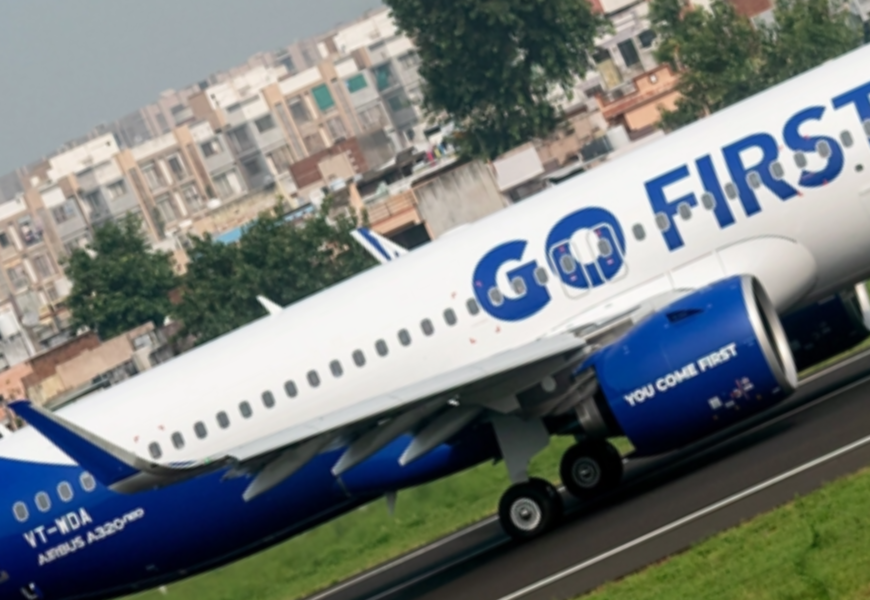Go First, an airline company that recently filed for voluntary insolvency is placing the blame on engine manufacturer Pratt & Whitney for supplying faulty engines that have forced the airline to ground half of its A320neo fleet. In response to these allegations, Pratt & Whitney has addressed the situation.
WHAT WENT WRONG WITH GO FIRST AIRLINES?
 Go First’s insolvency proceedings, initiated on May 2, 2023, have revealed a debt of $798 million owed to financial creditors. The airline stated in its filing that it had not defaulted on any of these dues until April 30 but anticipates future defaults to financial creditors. A Reuters report accessed the filing, which stated, “However, considering the present financial situation of the corporate applicant, defaults to financial creditors would be imminent.”
Go First’s insolvency proceedings, initiated on May 2, 2023, have revealed a debt of $798 million owed to financial creditors. The airline stated in its filing that it had not defaulted on any of these dues until April 30 but anticipates future defaults to financial creditors. A Reuters report accessed the filing, which stated, “However, considering the present financial situation of the corporate applicant, defaults to financial creditors would be imminent.”
The core of Go First’s accusation against Pratt & Whitney is that the engine supplier refused to comply with an award issued by an emergency arbitrator appointed under the 2016 Arbitrator Rules of the Singapore International Arbitration Centre. An official spokesperson for Pratt & Whitney responded to the allegations, saying, “Pratt & Whitney is committed to the success of our airline customers, and we continue to prioritize delivery schedules for all customers. P&W is complying with the March 2023 arbitration ruling related to Go First. As this is now a matter of litigation, we will not comment further.” The spokesperson added, “Go First has a lengthy history of missing its financial obligations to Pratt.”
On Tuesday, Go First filed for voluntary insolvency with the National Company Law Tribunal, blaming Pratt & Whitney for supplying faulty engines that led to the grounding of half of its A320neo fleet. According to a statement from Go First, the engine supplier failed to comply with an order from the emergency arbitrator appointed by the Singapore International Arbitration Centre. The order required Pratt & Whitney to promptly release and dispatch at least ten serviceable spare leased engines to Go First by April 27, 2023, and an additional ten engines per month until December 2023.
Go First alleges that Pratt & Whitney not only failed to comply with the emergency arbitrator’s order but also did not provide any assurance regarding the timeline for the future provision of spare leased engines. Furthermore, the airline claims that Pratt & Whitney has neglected to accept faulty engines for repair. “Had Pratt & Whitney complied with the emergency arbitrator’s award, all of GO FIRST’s aircraft would have been operational by August/September 2023, ensuring profitable operations in the fast-growing Indian aviation market. As a result of Pratt & Whitney’s failure to comply with the emergency arbitrator’s award, GO FIRST is being driven to take steps to enforce the award in the U.S. and other international jurisdictions,” stated Go First in a recent statement. 
Go First, which filed for voluntary insolvency proceedings on Tuesday, owes a reported $798 million to financial creditors. The company asserts in its filing that it has not defaulted on any of these dues until April 30, but future defaults to financial creditors are anticipated. According to Reuters, the filing states, “However, considering the present financial situation of the corporate applicant, defaults to financial creditors would be imminent.”
Lenders claim they were unaware of Go First’s plans to file for voluntary insolvency proceedings. Financial creditors such as the Central Bank of India, Bank of Baroda, IDBI Bank, Axis Bank, and Deutsche Bank are expected to convene soon to assess the situation. According to Reuters, the airline’s total liabilities, including debts to banks, financial institutions, vendors, and aircraft lessors, amount to $1.3 billion. The filing indicates that the company’s assets are insufficient to cover these liabilities.
Go First has defaulted on payments to operational creditors, including $146 million to vendors and $318 million to aircraft lessors. The filing also states that the airline has received termination notices from lessors regarding aircraft lease agreements, and some lessors have taken action to ground or repossess aircraft. Additionally, six lessors have invoked letters of credit issued by lenders.
 Due to its cash crunch, Go First has been forced to cancel flights on May 3, 4, and 5. This has led to a show cause notice from the Directorate General of Civil Aviation (DGCA) for failing to provide a prior intimation of the cancellations. The airline has assured passengers that they will receive refunds for all cancelled tickets.
Due to its cash crunch, Go First has been forced to cancel flights on May 3, 4, and 5. This has led to a show cause notice from the Directorate General of Civil Aviation (DGCA) for failing to provide a prior intimation of the cancellations. The airline has assured passengers that they will receive refunds for all cancelled tickets.
The financial troubles for Go First originated from the non-supply of engines by Pratt & Whitney, which resulted in the grounding of 28 of its planes. The company is now actively seeking investors to help resume its domestic operations.
The situation between Go First and Pratt & Whitney highlights the challenges faced by the aviation industry, particularly when it comes to the reliability and timely delivery of critical components. The grounding of aircraft due to faulty engines has severe financial implications for airlines, causing disruptions in operations and significant losses.
Go First’s decision to file for voluntary insolvency reflects the extent of its financial difficulties and the urgency to find a resolution. The airline’s reliance on Pratt & Whitney to rectify the engine issues and fulfil its obligations has been met with disappointment and allegations of non-compliance.
Pratt & Whitney, on the other hand, maintains its commitment to supporting its airline customers and delivering on their schedules. The company asserts that it is complying with the arbitration ruling related to Go First, but due to ongoing litigation, it refrains from further comments.
As Go First navigates the insolvency proceedings, its financial creditors and lessors will be closely monitoring the situation. The airline’s ability to secure new investments and resolve its issues with Pratt & Whitney will be critical in determining its future operations and the viability of the company.
The outcome of this dispute could have broader implications for the aviation industry, as it highlights the importance of reliable partnerships between airlines and manufacturers. It also underscores the need for robust mechanisms to address disputes and ensure timely resolution to minimize the impact on all parties involved.
WHAT IS THE FUTURE OF GO FIRST?
For now, Go First’s focus will be on stabilizing its financial situation, addressing its obligations to creditors, and securing the necessary resources to resume normal operations. The airline’s fate hangs in the balance as it seeks a path forward amidst a challenging and uncertain landscape in the aviation sector.




